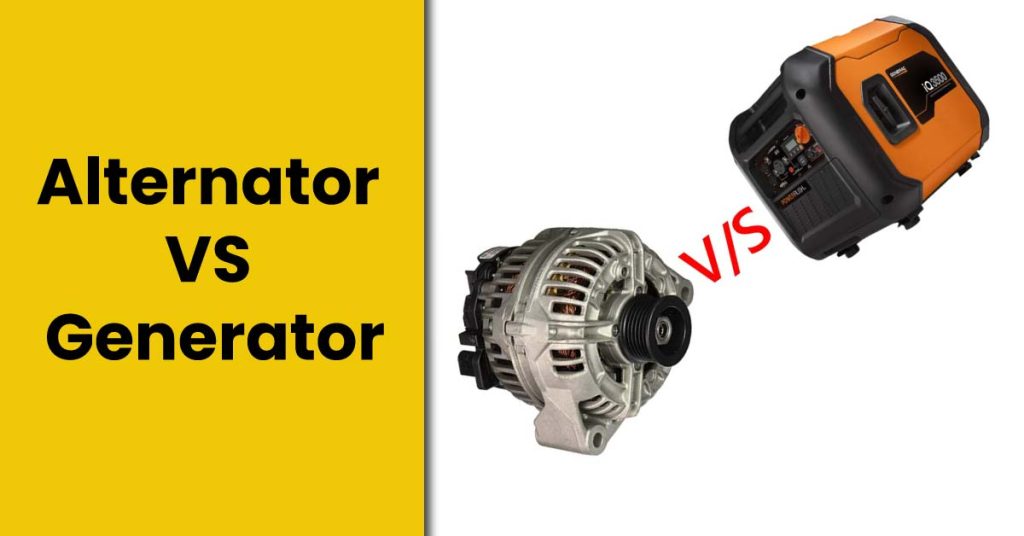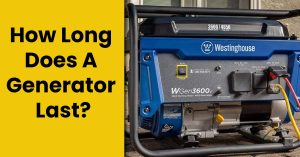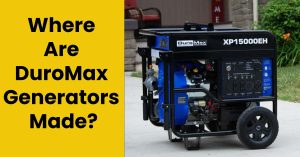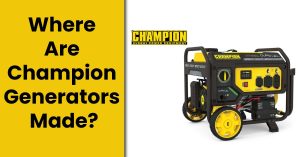Alternator vs Generator – Key Differences
The main difference between an alternator and a generator is that the armature of an alternator is stationary and the field system rotates while the armature of the generator rotates and its field system is stationary.
The armature of an alternator is usually mounted on the stationary element which is known as the stator and field winding on the rotating element. Whereas the connection of a generator is completely reversed of it.
There are many other significant differences between these two and in this article, we will discuss all of them. Just continue reading this article to get the necessary information about alternators and generators and also which one is better.
What Is An Alternator
An alternator is a system responsible for generating electricity. It converts mechanical energy into electricity as an alternating current AC. There is a magnet present in an alternator that rotates by creating a current that distributes energy and delivers electricity from generators.
The magnetic pole of the rotor gets excited by the direct field current. By rotation of the rotor, the magnetic flux cut the stator conductor and then electromotive force induces in them.
When the magnetic pole rotates by alternating North and South, they further induce electromotive force and current inside the armature conductor that starts clockwise rotation at first, and then it rotates in the anti-clockwise direction. In this way, the alternating current generates.
What Is A Generator
Similar to the alternator, a generator is also capable of converting mechanical energy into electrical energy. But when it comes to comparing an alternator and a generator, it is important to know that a generator has the ability to produce both alternating currents as well as direct currents.
You can get anyone from a generator either a direct current or alternating current.
There is a rotor inside the generator that rotates and by the rotation of this rotor, electricity generates while creating a magnetic field that results in the production of the required energy to spin the armature.
A generator has a rectangle rotating coil that rotates in the magnetic field around its axis. That magnetic field is either provided by a permanent magnet or an electromagnet.
Two slip rings play a role in binding the ends of the coil. The induced current is collected by a slip ring in the coil and then it is transferred to the external load resistance R. The rotating coil that is made of copper is called an armature.
Checkout our guide about smallest portable generator
Alternator vs Generator: Key Differences

Both, the alternator and generator work on the principle of the Faraday law of electromagnetic induction. A generator induces both direct and alternating current while the alternator induces an only alternating current.
The rotor of the generator is present inside the stationary magnetic field, and that stationary magnetic field is produced with the help of magnetic poles. The rotor rotates within the magnetic field by intersecting the magnetic line of force which induces the electric current in the wire.
By every half rotation of the rotor, the direction of the current changes which leads to the alternating current. For generating alternating current, the ends of the circuit are directly connected to the load. But in order to produce a direct current, the ends of the wire are connected to the commutator. The commutator plays role in converting alternating current into direct current.
Comparison Table
| Property | Alternator | Generator |
|---|---|---|
| Definition | An alternator is a system responsible for generating electricity. It converts mechanical energy into electricity as an alternating current AC. | A generator is also capable of converting mechanical energy into electrical energy. But a generator has the ability to produce both alternating currents as well as direct currents. |
| Output Current | An alternator constantly induces an alternating current. | a generator has the ability to produce both alternating currents as well as direct currents. |
| Energy Conservation | Alternators use only the essential amount of energy and thus, it preserves more energy. | Generators use all the energy that is produced and so, they conserve less energy. |
| Energy Efficiency | Alternators are very efficient. | Generators are considered less efficient. |
| Polarization After Installation | Polarization is not required in the case of alternators. | Generators need to be polarized after installation. |
| Armature Movement | The armature of an alternator is stationary. | The armature of a generator is rotating. |
| RPM (Rotation Per Minute) Range | Alternators have a wide range of RPM. | Generators have a low range of RPM. |
| Size | Alternators are generally smaller in size. | Generators are larger and require more space to fit in. |
| Voltage Generation | Alternators produce voltage only when needed. | Generators produce voltage at all times. |
| Uses | Mainly used in the automobile industry as a charging system for the battery. | Generators are widely used to produce large-scale electricity. |
Advantage Of Alternator Over Generator
There are some benefits of alternators over generators that are mentioned below:
Higher Output:
By comparing an alternator vs a generator, one advantage that can be achieved is the parts of an alternator are more robust than a generator. It helps them in making quick rotations without the risk of any damage. If the rotation speed will be higher then the alternator will be able to generate more power. An alternator also generates more power at low speeds that will help you to recharge even when your vehicle is idling.
Checkout our guide about 10000 watt generators
Smaller Size & Lower Weight:
The more compact way of electricity generation is possible by an alternator, which has two other important benefits.
- An alternator is considered as more weight-saving as compared to a generator. As you might know, a lighter car will ensure better fuel economy that will also save you money.
- The size of the alternator is comparably smaller making it easy to fit into an already occupied engine space or compartment to work the time for repair and maintenance.
Less Maintenance:
The same system of rings and brushes are present in both alternator and generator to produce electricity but the designs of them are comparable and different. Split rings are present in generators while there are solid rings present in alternators. These brushes rub against both rings.
The brushes in the generator wear quickly by rubbing against the splits in rings. While the alternator has smooth rings that do not lead to these kinds of issues. That is why an alternator will require overall less maintenance which is one significant aspect to differentiate alternator and generator.
Conclusion
That is all about alternator vs generator you needed to know. Now you might have understood why they are not used instead of each other. They mainly create the same results but differ in their applications and internal construction.
However, both generators and alternators create power in the form of electricity.

Josh is a highly skilled electrician with specialized expertise in the field of generators. With years of experience under his belt, he has established himself as an expert in all aspects of generators, ranging from installation and maintenance to troubleshooting and repairs. Josh’s in-depth knowledge of electrical systems and his commitment to staying updated with the latest industry advancements make him a reliable and sought-after professional.






